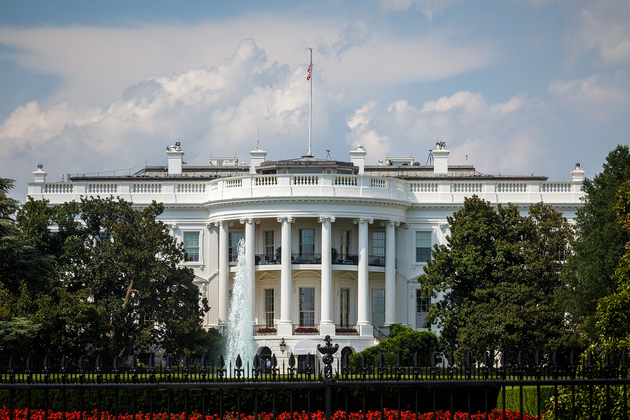
Photo/VCG
The U.S. stock market has been rife with uncertainty this week. In addition to the sharp rise in long-term Treasury yields, which has strengthened expectations of the Federal Reserve's "higher-for-longer" policy, the U.S. government is facing a fourth shutdown crisis in 10 years as Congress has yet to reach an agreement on a funding bill to temporarily keep the federal government running.
Specifically, if the U.S. Senate and House of Representatives fail to pass a funding bill by 11:59 p.m. ET on Saturday, September 30 (11:59 p.m. Beijing time on October 1), the U.S. government will shut down. During the shutdown, thousands of federal employees will be furloughed and "non-essential" federal services will be closed.
However, analysts generally believe that the impact of a U.S. government shutdown on the market will be limited. Derek Halpenny, head of global market research at Mitsubishi UFJ Financial Group, said in an email to the China Daily that the last government shutdown in 2018 was the longest on record, but it had little impact on the U.S. economy or markets. At the time, a series of global factors and the Fed's tightening policy led to a sharp sell-off in U.S. stocks, but the government shutdown itself was not a major factor in the decline.
U.S. government shutdown looms as Congress fails to reach budget deal
The U.S. government is facing a shutdown on October 1 as Congress has failed to reach a budget deal. The current fiscal year ends on September 30, and if Congress does not pass a funding bill by then, the government will be forced to close some of its operations.
The shutdown would affect millions of federal employees, who would be furloughed and not paid until the government reopens. It would also disrupt a number of government services, including national parks, museums, and passport processing.
The shutdown is becoming increasingly likely as the deadline approaches. Goldman Sachs estimates that there is a 90% chance of a shutdown.
If a shutdown does occur, it is expected to have a significant impact on the U.S. economy.The shutdown would also have a negative impact on the public's confidence in the government.
Similarly, a team at Japan's Nomura Securities released a research report on the same day that concluded that there was a 90% chance of a government shutdown. Nomura predicted that the shutdown would last one to two weeks, or longer. Nomura also noted that "shutdowns are supposed to be unpopular and short-lived, but the Republican Party's narrow majority in the House of Representatives makes it more difficult to reach a compromise."
How will a government shutdown impact the financial markets?
According to a report by the Associated Press, the U.S. federal government has experienced 22 funding gaps since 1976, 10 of which have led to furloughs of government employees. The longest government shutdown in U.S. history occurred in 2018-2019, lasting 34 days during the Trump administration. The shutdown was caused by a disagreement between Republicans and Democrats over funding for a border wall between the United States and Mexico. In 2013, a government shutdown of 16 days was triggered by Republican lawmakers who opposed the Affordable Care Act.
Stephen Juneau, an analyst at Bank of America, noted that the impact of a government shutdown on financial markets is typically limited. On average, US interest rates and the dollar index are barely affected, and the S&P 500 index and volatility index typically respond flatly. However, the 2018-2019 government shutdown was a notable exception. At the time, the stock market saw a sharp sell-off due to the hawkish FOMC meeting of the US Federal Reserve in December 2018, coupled with weakening US economic data. Implied equity volatility also rose sharply.
Derek Halpenny, global head of market research at Mitsubishi UFJ Financial Group, also mentioned the 2018 US government shutdown in an email to NBD. He noted that "the looming US government shutdown is a factor affecting markets this week. The 2018 government shutdown was the longest on record, but it had little impact on the US real economy or markets. At the time (December 2018), a series of global factors and the Federal Reserve's tightening policy led to a sharp sell-off in US stocks, but the government shutdown itself was not a major factor affecting the market."
"The dollar did indeed fall by more than 2% during the 2018 government shutdown. The government shutdown certainly does not help to boost market sentiment, and 1 million government workers may also be affected. If the shutdown lasts longer than the 2018 one, it could start to have a more widespread impact. We expect the scope of this shutdown to be wider than in 2018. But so far, the dollar has continued to strengthen. Although the dollar index recorded its 10th consecutive weekly gain last week, the market is very nervous, and the government shutdown, which is attracting increasing attention, could be a catalyst for at least a temporary pullback. However, the decline in US Treasury yields triggered by the stock market seems more likely to lead to a reversal in the foreign exchange market, with 10-year Treasury yields currently down several basis points from their Wednesday highs," Halpenny added.
Jonathan Millar, senior economist at Barclays US, noted in an email to a reporter from the China Daily that if the US government shuts down, a "continuing resolution" will be needed to extend non-essential government spending. Millar believes that, in general, a government shutdown reduces US GDP by 0.1 percentage point per week, but that, historically, the loss to GDP is fully offset once the US government resumes operations and government workers are compensated.
"However, the government shutdown will affect the government's ability to collect, process, and release real-time statistical data, which could affect the reliability of the final statistical data released," Millar added.


 川公网安备 51019002001991号
川公网安备 51019002001991号





